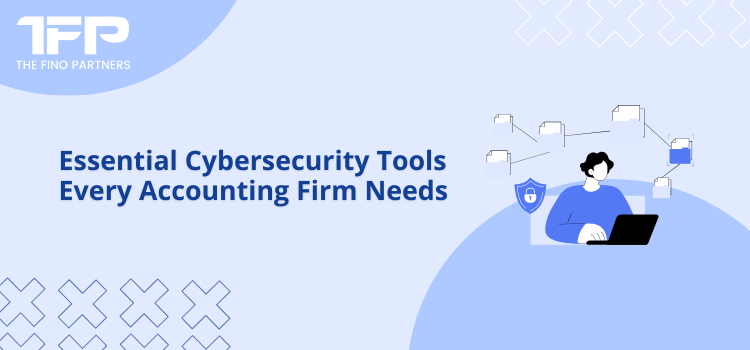Have you noticed lately how small businesses, particularly CPA accounting companies have become the new targets for cybercriminals? With the U.S. economy becoming reliant on startups, small businesses and entrepreneurs, protecting financial data has never been more essential. If you operate an accounting firm or use accounting outsourcing services, you should understand which cybersecurity tools you need to remain safe and sound.
Let us explore the top cybersecurity tools for accounting firms to safeguard your sensitive data, preserve client trust, and also meet legal needs.
Why is Cybersecurity Important to Accounting Firms?
You have a responsibility if you handle financial information - tax returns, payroll info, personal details or business ledgers. Cybercriminals love this info as they could utilize it to steal individuals identities, commit a crime and blackmail.
With no effective cybersecurity in place, your accounting firm risks:
- Massive financial losses from ransomware attacks.
- Legal trouble for not protecting client data.
- Loss of clients' trust creates reputation harm.
- Data breaches bring about business disruption.
Simply put, cybersecurity isn't optional any longer. It is an essential element of managing a contemporary accounting firm.
Top Cybersecurity Tools Every Accounting Firm Needs
These are some of the best cybersecurity tools for accounting companies to keep your company secure.
1. Firewalls
Your first line of defense is a firewall. This is like a digital security guard. It evaluates all outgoing and incoming Internet traffic and decides what must be permitted or obstructed according to safety regulations.
Why You Need It:
- Blocks suspect traffic before it hits your computer.
- Protects from malware and hackers.
- Essential for any internet-connected accounting office.
Tip: Pick a next generation firewall with threat prevention and antivirus functionality.
2. Antivirus & Anti-Malware Software
Viruses and malware could destroy documents, steal client information or lock you out of your personal computers. The use of excellent antivirus software is a must for CPA accounting companies.
Why You Need It:
- Detects and eliminates malicious programs.
- Protects client files/accounting software.
- Scans email, attachments & downloads.
3. Secure Accounting Software
When you deal with very sensitive data on a daily basis, secure accounting software is vital. These provide protection against data leaks and hacking attempts.
Features to Look For:
- Two-factor authentication (2FA).
- Data encryption for accountants.
- Security updates every several months.
- Cloud backup with security controls.
Examples: QuickBooks Online (with appropriate configurations), Xero and FreshBooks.
4. Data Encryption for Accountants
Encryption means scrambling your information so that hackers can not read through it without a "key."
Why You Need It:
- Keeps client info unreadable in case it is stolen.
- Protects email, tax documents, payment info.
- Essential for complying with data protection regulations.
Tools like VeraCrypt or the built in encryption option in Microsoft Office and Google Workspace are simple to set up.
5. VPN (Virtual Private Network)
A VPN conceals your connection to the internet out of unwanted eyes - particularly in case you or your workers work remotely.
Why You Need It:
- Encrypts your online traffic.
- Hides your location & IP address.
- This gives some additional security over public Wi-Fi.
Use reputable VPN services like NordVPN or ExpressVPN for your firm.
6. Intrusion Prevention and Detection Systems (IDPS)
IDPS software checks your system for abnormal behavior and blocks threats before they result in damage.
Why You Need It:
- Detects attempts at hacking early.
- Blocks unauthorized access.
- Alerts you of security breaches.
Businesses serious about cybersecurity in accounting often employ tools like Snort and Suricata.
7. Endpoint Protection Platforms (EPP)
Every device is a target - laptop computer, desktop computer, smartphone. All these access points are secured by endpoint protection tools.
Features Include:
- Device tracking.
- Remote data wiping.
- Malware protection.
- Application control.
Popular choices include Sophos and CrowdStrike.
8. Email Security Tools
Emails are a common way hackers break into businesses. Phishing scams, malware laden attachments in addition to phony invoices all slip through without strong email protection.
Essential Features:
- Filtering spam.
- Phishing protection.
- Email encryption.
Microsoft Defender for Office 365 and Proofpoint are also some excellent choices.
9. SIEM (Security Information and Event Management) Systems
SIEM solutions gather security data from throughout your company and offer real-time threat alerts.
Why You Need It:
- Monitors all devices/applications.
- Identifies suspicious activity early.
- Helps you react rapidly during attacks.
Many CPA accounting firms use Splunk or IBM QRadar as SIEM tools.
10. Penetration Testing and Vulnerability Scanners
You should test your systems like hackers might, before real criminals discover the holes.
Tools That Help:
- Nessus (for vulnerability scanning):
- Metasploit (for penetration testing):
Why It Matters:
By running mock attacks, you find weak spots and fix them before they become real issues.
Best Security Practices to Combine with Tools
Without good practices even the best cybersecurity tools might fail. Some additional must-dos are:
- Use Strong, Unique Passwords: A different strong password on each system.
- Set up Multi Factor Authentication (MFA): Always add an additional step beyond simply a password.
- Back Up Data Frequently: At least once per day to a protected cloud or offsite server.
- Restrict Access to Sensitive Information: Only provide access to people who want it.
- Give Cybersecurity Training to Staff: Teach your team to spot a scam and to safeguard data.
Conclusion
Cybersecurity is a must if you want to safeguard your accounting business and there are no shortcuts to this. From firewalls and SIEM systems to secure accounting software, each tool is vital. With such good habits, you can create a solid defense.
Keeping client data safe must be a top priority whether you run an independent CPA firm or use accounting outsourcing services. With the appropriate cybersecurity tools and alertness, you can keep your firm safe, competitive and trusted for decades to come.




























